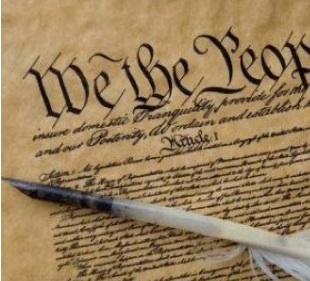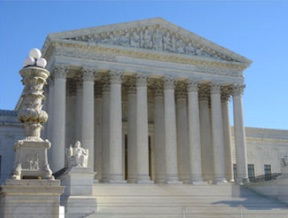The Constitution and Wine
 This week, upon being sworn in and taking over control of the House of Representatives, Republicans will take to the floor of the House to read the entire United States Constitution.
This week, upon being sworn in and taking over control of the House of Representatives, Republicans will take to the floor of the House to read the entire United States Constitution.
What does this have to do with wine?
Not much really, but the relationship between commerce and wine, and the way our Constitution sets up a single economic union, is important for us to be aware of. It's important particularly in 2011 since it is likely that one way or another, the federal government will have something to say about commerce and wine this year.
It is in Article One, Section Eight of the Constitution that we find the Commerce Clause. It reads:
"The Congress shall have Power to regulate Commerce with foreign Nations, and among the several States, and with the Indian tribes"
This single sentence in the Constitution was the foundation upon which the Supreme Court determined in 2005 in the Granholm v. Heald decision that, despite the 21st Amendment to the Constitution:
"Time and again this Court has held that, in all but the narrowest circumstances, state laws violate the Commerce Clause if they mandate “differential treatment of in-state and out-of-state economic interests that benefits the former and burdens the latter.”
"Differential treatment" is exactly what existed when states allowed their own wineries and retail stores to ship wine directly to their local residents, but prohibited out-of-state wineries from doing the same. To this point, the Court went on to write:
"This rule is essential to the foundations of the Union…States may not enact laws that burden out-of-state producers or shippers simply to give a competitive advantage to in-state businesses."
The reason this idea of states not interfering with interstate commerce is critical is because without a single economic union that runs across all the United States, we end up with trade barriers that hurt consumers and economic activity. The Court put it succinctly in Granholm when they wrote:
"This mandate “reflect[s] a central concern of the Framers that was an immediate reason for calling the  Constitutional Convention: the conviction that in order to succeed, the new Union would have to avoid the tendencies toward economic Balkanization that had plagued relations among the Colonies and later among the States under the Articles of Confederation."
Constitutional Convention: the conviction that in order to succeed, the new Union would have to avoid the tendencies toward economic Balkanization that had plagued relations among the Colonies and later among the States under the Articles of Confederation."
And yet even given this directive by the highest court in the land, interstate commerce in wine remains burdened by state laws that discriminate against interstate commerce, retards the legitimate growth of the American wine market and impedes economic growth. While 37 states now allow their residents to have wine shipped to them from out of state wineries ONLY 13 STATES ALLOW THEIR CITIZENS TO PURCHASE WINE FROM OUT OF STATE RETAIL WINE STORES. And many of these states prohibit their residents from belng shipped wine from out-of-state retail stores while allowing it from in-state stores.
The reason this unconstitutional burden on interstate commerce continues to exist, even in the wake of the Granholm decision is because wholesalers in most states have convinced the legislators to whom they give millions of dollars that the Granholm case did not apply to retail wine store commerce, but rather just to winery/producer related commerce. In addition, consumers and wineries that have benefited greatly from the Granholm decision have not seen a necessity to secure the same right for wine store commerce.
Two events will effect this state of affairs in 2011. The re-introduction of HR 5034 in Congress and the decision of the Supreme Court on whether or not it will hear an appeal of a lawsuit in which a lower court ruled that retailers have no Commerce Clause protection against discriminatory state laws in the same way wineries do.
 HR 5034, introduced first last year and that failed to get out of the House Judiciary Committee, would have the effect of officially stripping every single retail wine store in America of its Commerce Clause protection against state "laws that burden out-of-state producers or shippers simply to give a competitive advantage to in-state businesses". HR 5034 is a blatant attempt by beer and wine wholesalers to change the rules in the middle of the game because they are perturbed that the laws they have demanded be passed to help them control the wine market have been called unconstitutional.
HR 5034, introduced first last year and that failed to get out of the House Judiciary Committee, would have the effect of officially stripping every single retail wine store in America of its Commerce Clause protection against state "laws that burden out-of-state producers or shippers simply to give a competitive advantage to in-state businesses". HR 5034 is a blatant attempt by beer and wine wholesalers to change the rules in the middle of the game because they are perturbed that the laws they have demanded be passed to help them control the wine market have been called unconstitutional.
HR 5034 is related to the law suit mentioned earlier.
In Wine Country Gift Baskets v. Steen, retailers sued the state of Texas on the grounds that in the face of the Granholm decision, Texas continues to allow its residents to have wine shipped to them from in-state retail wine stores, but prohibits consumers from purchasing wine from out-of-state wine retail stores. A Federal District Court in Texas called this unconstitutional in the same way that a Michigan Federal District Court called a similar in that state unconstitutional. In Michigan, the wholesalers, working hand-in-hand with the Michigan Liquor Control Commission simply stripped all retailers of their right to ship wine to Michiganders in a cynical, anti-consumer, market-disrupting payoff to wholesalers.
However, the Texas decision was overturned by the Fifth Circuit Court of Appeals that ruled because the Supreme Court had previous mentioned that the Three-Tier System is "unquestionably legitimate" and because direct shipping is part of what retailers do, a state is able to discriminate against out-of-state wine retail stores. The problem with this decision is that the Fifth Circuit failed to even do a simple evaluation of the the Texas State law and its effect on interstate commerce, as they are required.
The Supreme Court has officially been asked to take up this case.
However, if HR 5034 passes, the lawsuit and any hope that the Supreme Court will hear the case will be over. HR 5034 would give congressional approval to the stripping from retailers of their right to be protected from discriminatory state laws. This would be a nearly unprecedented action on the part of Congress that has only stripped a single industry of its Commerce Clause protections once before in the 223-year history of the Constitution.
Having worked with the Specialty Wine Retailers Association for the past three years, I've become somewhat close to this issue. I work with a number of wine retailers across the country who are members of the Association. Their ability to serve a national marketplace in wine is critical for the simple reason that no set of wholesalers in any state can deliver all the wines to retailers that the state's consumers want. However, if a state allows direct shipment from out-of-state retailers, then the entire American wine marketplace is open to consumers and retailers are given the opportunity to serve those consumers.
There is no question in my mind, having read through most of the Supreme Court cases that led up to and including Granholm, that this ongoing discrimination against interstate commerce by wine retail stores in unconstitutional. Nor is there any doubt in my mind that allowing consumers the ability to have wine shipped to them from out-of-state retailers would well serve wine consumers, deliver to the states additional tax revenue and that it can be done in a fashion that allows the state to regulate this brand of commerce.
But just like with HR 5034, American beer and wine wholesalers will continue to work to thwart the will of the American consumer for their own interests by continuing to argue that the Three-Tier System is somehow of greater constitutional importance than the commerce clause.
The fact is, the three tier system in its current form is the single most important impediment to entrepreneurial success in the wine industry. When it is combined with prohibitions on winery or retailer direct shipping, consumers find they have access to a paltry number of wines. Most important, with these restrictions remaining in place, we have a situation where a small group of powerful wholesalers who understand extraordinarily little about wine consumers, control the wine consumers access to wine.
When you listen to the Constitution being read on the house floor, it should be instructional to note that nothing in the Constitution actually prevents this kind of perversion of the American economy by wholesalers. So while wine lovers need to work to protect their interests, they might also want to consider how the Constitution might be changed so that a single group of campaign contributors can't completely control the wine marketplace and how laws effecting that marketplace are passed.

Tom,
Awesome, awesome post. With the Constitution all over the news today, I hope lots of folks think of wine shipping laws and how they fly in the face of the Commerce Clause.
Good on ya, Tom. I for one hope the current media attention back on the U.S. Constitution helps inform more consumers about these thoroughly anti-Constitutional state laws and in turn builds pressure on legislators to start allowing truly free commerce to live and breathe in terms of alcohol sales in this country.
I think you said it all. I am in Texas and get regular shipments from Napa Valley winery wine clubs but I am thwarted from buying other wine that I can’t find here from on-line wine shops. It makes no sense. Friends in Pennsylvania have it even worse. I hope you are correct that we will see a positive resolution for consumers this year.
Tom – thanks for this. I’m passing a link onto a wine entrepreneur group I’m part of on linkedin to keep the awareness of HR5034 high.
Haven’t seen you since the old appellationamerica days.
Hope you are well.
Dan
Anyway this article (or a shorter version of it) can appear on the WSJ, NY Times etc.? Magnificent and to the point.
[email protected]
Way to keep up on this, Tom. After seeing your goal of reading the briefs, I had to hop onto Lexis and pull up the 5th circuit opinion. That court used some pretty circular arguments near the end.
I hope I’m wrong in disagreeing with 1WineDude regarding the media attention on the Constitution. I expect it will be more focused on the wingnuts and their claims we should return to what the Framers intended. Newsflash: the Founding Fathers were anything but united on what the constitution should look like or whether it was even needed.
Excellent post Tom, thank you. We have recommended your link on our blog http://www.montesquieuwinelovers.com/all-i-want-for-christmas-is-fair-wine-shipping-laws/#more-1036 and Facebook, and will re-post with this current coverage.
Happy New Year!
The issue here is that the constitutionality has to be challenged in each state that has these silly laws. See http://www.law.indiana.edu/instruction/tanford/web/wine/
Tom: Thank you for continuing to shine the light on wine law in the United States and individual states.
Let’s hope the forces of free commerce prevail and those who restrict/continue to restrict consumer rights are turned back e.g. HR5034.
Even with permissions, direct wine shipping commerce to states requiring shipping permits and fees continues to restrict family/small winery sales and consumer choice. No impact on the big wineries though.